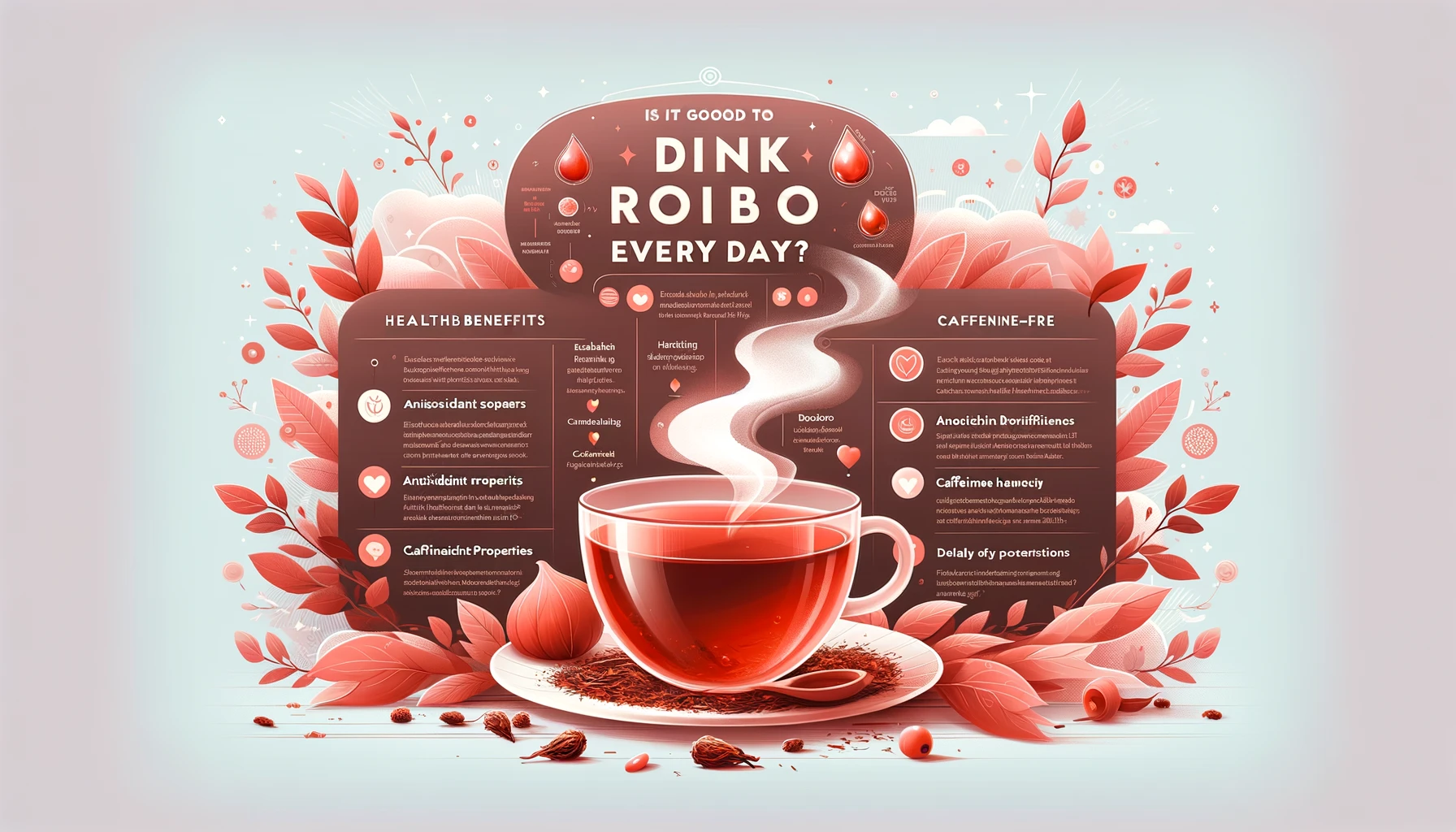Rooibos, also known as red tea, is a herbal tea native to South Africa and has gained popularity worldwide for its health benefits. Unlike traditional teas, it is caffeine-free and boasts a high antioxidant content. This article explores the advantages and considerations of consuming rooibos tea daily, supported by scientific research.
1. Nutritional Profile of Rooibos
Rooibos is known for its unique nutritional profile, which includes a variety of antioxidants and minerals.
- Rich in Antioxidants: Rooibos contains unique antioxidants such as aspalathin and nothofagin, which are not found in other teas. According to a study in the "Journal of Agricultural and Food Chemistry," these antioxidants can help protect against free radical damage【1】.
2. Benefits for Heart Health
Regular consumption of rooibos tea may offer heart health benefits.
- Cardiovascular Health: A study published in the "Journal of Ethnopharmacology" found that rooibos tea can improve heart health by lowering blood pressure and improving cholesterol levels【2】.
3. Rooibos for Stress and Sleep Improvement
The absence of caffeine makes rooibos an excellent choice for reducing stress and improving sleep quality.
- Relaxation and Sleep: Research in the "South African Journal of Botany" suggests that rooibos may have a calming effect on the central nervous system, promoting better sleep and reducing stress【3】.
4. Potential Anti-Diabetic Effects
Rooibos might also have benefits for blood sugar regulation.
- Blood Sugar Control: The antioxidant aspalathin in rooibos has been shown to help regulate blood sugar and improve insulin resistance, as per studies like those found in "Phytomedicine"【4】.
5. Skin Health Benefits
Rooibos may also contribute to healthy skin.
- Skin Protection: The antioxidants in rooibos can help protect the skin and aid in reducing the signs of aging, according to the "Journal of Cosmetic Dermatology"【5】.
6. Digestive and Immune Health
Rooibos can support digestive health and may enhance immune function.
- Digestive Benefits: Its anti-inflammatory properties can help soothe the digestive system, as noted in the "Journal of Ethnopharmacology"【6】.
- Boosting Immunity: The antioxidants in rooibos may support the immune system, although more research is needed in this area.
7. Safety and Side Effects
Rooibos is generally considered safe for daily consumption, with few known side effects.
- Caffeine-Free: Being caffeine-free, rooibos is a suitable option for those looking to reduce caffeine intake.
- Allergies and Interactions: While rare, some individuals may be allergic to rooibos, and it may interact with certain medications, so consultation with a healthcare provider is advisable.
8. Considerations for Daily Consumption
While there are many benefits to drinking rooibos tea daily, it should be part of a balanced diet.
- Balanced Diet: Rooibos should complement a diet rich in fruits, vegetables, whole grains, and lean proteins.
Conclusion
Daily consumption of rooibos tea can offer a range of health benefits, from improving heart health to aiding in relaxation and sleep. Its unique antioxidant profile makes it a valuable addition to a healthy diet. As with any dietary supplement or beverage, moderation and variety are key to a balanced diet.
References
- Joubert E., Gelderblom W.C.A., Louw A., de Beer D. (2008). "South African herbal teas: Aspalathus linearis, Cyclopia spp. and Athrixia phylicoides - A review." Journal of Agricultural and Food Chemistry.
- Marnewick J.L., Rautenbach F., Venter I., et al. (2011). "Effects of rooibos (Aspalathus linearis) on oxidative stress and biochemistry of rat liver exposed to lead and cadmium." Journal of Ethnopharmacology.
- Bramati L., Minoggio M., Gardana C., et al. (2002). "Quantitative Characterization of Flavonoid Compounds in Rooibos Tea (Aspalathus Linearis) by LC-UV/DAD." South African Journal of Botany.
- Son M.J., Minakawa M., Miura Y., Yagasaki K. (2013). "Aspalathin improves hyperglycemia and glucose intolerance in obese diabetic ob/ob mice." Phytomedicine.
- Auvray P., Whiteside D. (2012). "The potential of aspalathin-enriched green rooibos extract in the prevention of UVB-induced skin cancer." Journal of Cosmetic Dermatology.
- McKay D.L., Blumberg J.B. (2007). "The role of tea in human health: an update." Journal of Ethnopharmacology.
Discover rooibos on the Amazon store : link

Leave a comment